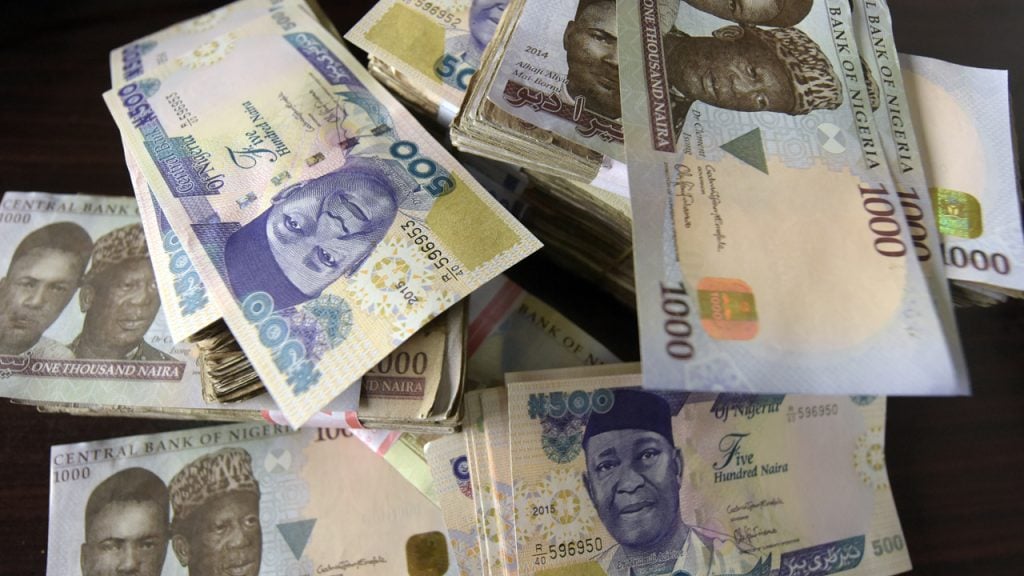On the first trading day of November 2025, on Monday, the naira slid from its 2025 peak of 1421.73/$ to 1,436.34/$, a sharp 1.03 per cent decline or N14.61 shed in one day, according to data from the Central Bank of Nigeria.
At the parallel market, the naira faced the same fate as it weakened at the parallel market to 1,455.00/$.
This decline followed a weekend of Nigeria being threatened by the US President, Donald Trump, with military action following claims of Christian genocide.
The PUNCH reported that Trump had named Nigeria as a “country of particular concern” on October 31,2025, saying the development reflects a global worry over Nigeria’s rising insecurity.
Via his Truth Social platform on Saturday, Trump directed the Department of War to prepare for “possible action” if the killings continued.
At the Nigerian Exchange Limited, bearish trading resumed on Monday, as the All-Share Index contracted by 0.25 per cent to settle at 153,739.11 points, bringing year-to-date gains to 49.37 per cent.
The trading trend also led to a loss of N245.88bn as market capitalisation dropped to N97.58tn.
The market’s downturn largely stemmed from selloffs in Aradel (-9.21 per cent) and Access Corp (-3.07 per cent).
Investor sentiment remained fragile as 38 stocks lost, thus outweighing 19 gainers. Overall, Union Dicon (+9.93 per cent) led the gainers’ log, while Honeywell (-10.00 per cent) topped the laggards’ chart.
Trading activity moderated sharply as total volume and value traded fell 87.94 per cent and 44.64 per cent, respectively, to 627.5 million units worth N25.00bn.
United Bank for Africa dominated both metrics, accounting for 136.8 million units (21.8 per cent of total volume) valued at N5.5 billion (22.2 per cent of total value).
Sectoral performance was mixed with Oil & Gas (-3.94 per cent), Commodity (-1.85 per cent), Insurance (-1.48 per cent), and Banking (-0.22 per cent) recording capital decline, while Consumer Goods gained 0.49 per cent. The Industrial sector closed flat.
At the bond market, Cowry Assets Management in its daily report indicated that appetite for the Nigerian Eurobond weakened on Monday, with average yields expanding 5bps to 7.70 per cent, indicative of bearish sentiment and defensive positioning in the offshore debt space, which the investment house is being driven by prevailing macroeconomic headwinds and heightened geopolitical risk aversion across emerging market credit.
According to Bloomberg on Monday, Nigeria’s dollar bonds suffered the biggest losses in emerging markets.
They fell across the maturity curve, comprising all 10 of the worst performers in emerging markets worldwide as of 10:45 a.m. (Lagos time).
The news platform revealed that the notes maturing in 2047 were down most, falling as much as 0.6 cents on the dollar to 88.26 cents before paring the decline.
Reacting to the development, the Chief Executive Officer of CFG Advisory, Tilewa Adebajo, in a note to The PUNCH on Monday, said that the reaction of the market was not sustainable.
“The CFG Advisory is of the opinion that this is a mere blip and closing prices in global markets today reflect erasing earlier losses and the recovery. Nigeria, taken off the Grey List, offers more sustainable pricing,” he said.
The CEO of Centre For The Promotion Of Private Enterprise, Dr Musa Yusuf, in a policy brief issued on Monday, also cautioned that the threat of the US president would erode investors’ confidence.
He said, “The US President’s threat of military intervention in Nigeria is unwarranted, counterproductive, and economically destabilising. It is a disproportionate response that fails to reflect the complexity of Nigeria’s internal security dynamics.
“Such statements send unsettling signals to investors, heighten risk perception, and undermine confidence in Nigeria’s economy. While Nigeria must continue to strengthen its internal security architecture and governance, any external engagement should be cooperative, not coercive.
“Unilateral military action would destabilise Nigeria’s economy, threaten regional stability, and aggravate humanitarian conditions. The constructive path forward lies in diplomacy, partnership, and shared commitment to peace, development, and mutual respect for sovereignty.”














